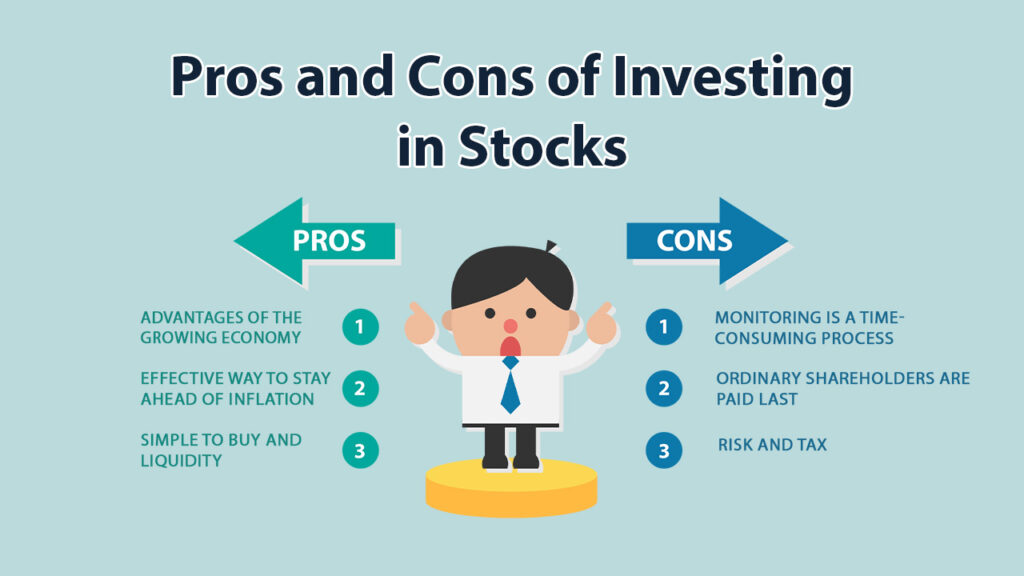Investing in stocks means owning a share of the company. This gives ownership rights and shareholders have right to vote. As the company grows, there is a probability that the investment grows parallelly.
Here are some pros and cons of investing in the stock market:
The stock market has traditionally offered solid returns to shareholders over time. However, at times, there have been losses too. Therefore, investors need to invest in equity according to the risk appetite.
Pros of Investing in Stocks:
Advantages of the growing economy
When the economy improves, there is a high probability that the improvement can be seen in the company’s earnings too. This is because when the economy improves, it creates more employment opportunities. As a result, income is generated which helps in increasing the spending power. Higher spending eventually leads to improvement in the demand trends. Finally, higher demand helps in improving the company’s revenues.
Effective way to stay ahead of inflation
Stocks have historically provided a high annualised return in the long run. For example, NIFTY50 has delivered a return of ~73.1% over the past 5 years. In fact, some individuals say that equities are instruments which can help deliver inflation-proof returns. However, regular monitoring is of utmost importance in equity investments as the stock market is volatile.
Simple to buy
Since the listed companies are traded on the stock exchanges, it is quite simple to make a purchase. Nowadays, an individual can open his/her demat account by following the online process. Therefore, a broker can execute the trades. After setting up an account, you can begin purchasing stocks within seconds. There are companies in India which offer advisory services to their clients.
Liquidity
By their very nature, equity investments are liquid. However, investors need to be aware that the stock is not a low-float stock. Investors have an opportunity to sell their stock on the stock exchange according to their requirements. By definition, liquidity refers to the ability to convert an asset into cash without compromising on the asset’s price.
Capital appreciation or dividends
Most shareholders plan to make a purchase when the prices are low. They tend to sell when they think that the prices have peaked. Therefore, they make investments in those companies which are growing rapidly. Several measures are required to be considered before making investments in such companies. These companies appeal to both short-term traders and long-term investors. While former tries to book profits in a short time span, latter anticipates that the company’s performance and its stock price will improve over time.
There are investors who prefer to stay invested because of the dividends. Such investors prefer a steady cash flow. Such types of businesses expand at a moderate rate as the profits are distributed among the shareholders instead of making reinvestments.
Cons of Investing in Stocks
Following are some of the drawbacks of making investments in the stocks:
Risk
Investments in the shares are quite risky because of the volatility in the share prices. There is a possibility of investor losing his/her entire investment value. When a company performs poorly, investors tend to sell their holdings. Thus, the share price falls drastically. Investors with lower risk appetite prefer investing in the bonds as these are safer in comparison to equities.
Ordinary shareholders are paid last
If the company is liquidated, ordinary shareholders are the ones who are paid last. Preferred stockholders, bondholders, and creditors are compensated on priority. However, this happens only when a company goes out of business. Therefore, it is advised that investments should be diversified.
Monitoring is a time-consuming process
If you are purchasing stocks on your own, you must research each company thoroughly to figure out its financial well-being. Therefore, an individual should learn to read income reports and financial statements so that he/she can understand the company’s financial numbers. Apart from this, investments should be tracked regularly as there can be market crashes which will impact the investment value.
Taxes
Profits made on the equity investments are liable for taxes. If an investor sells a stock at profit before 1 year, he/she is liable to pay short-term capital gain. However, if an investor sells after one year at profit, he/she will attract long-term capital gains.
Last Words
Investing in stocks has both advantages and disadvantages. Stocks have historically generated solid long-term returns, but investing in stocks also carries considerable amount of risk. These risks can be diversified by making investments into different industries and geographies.






